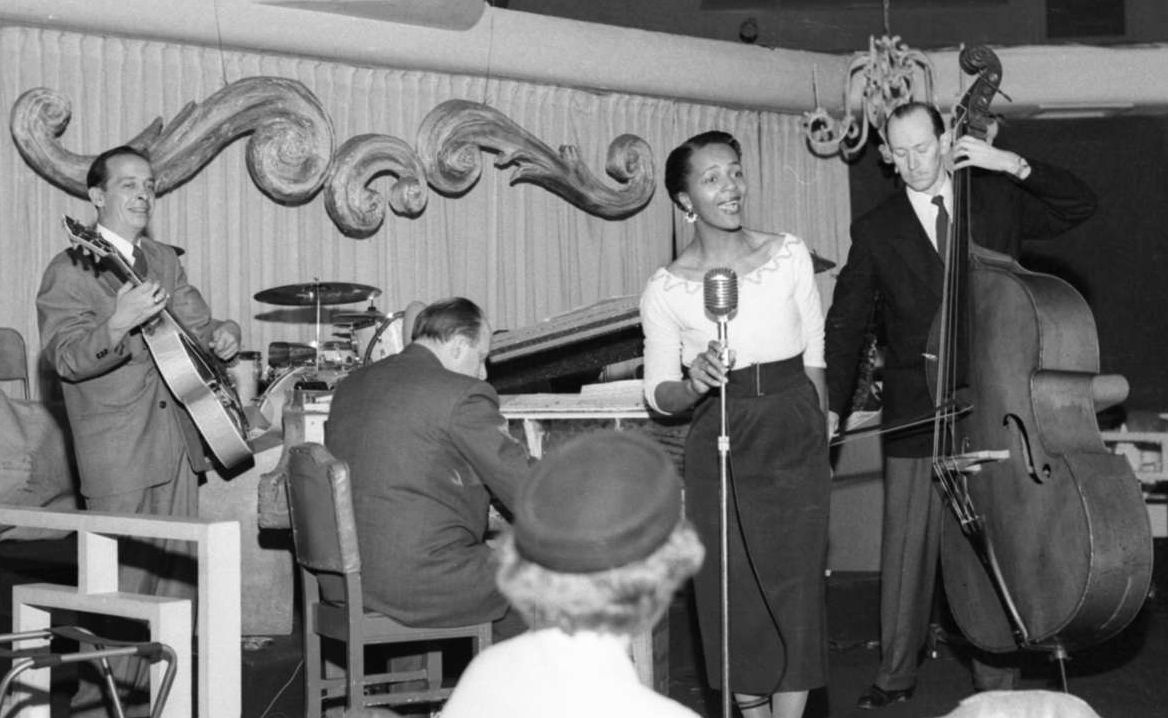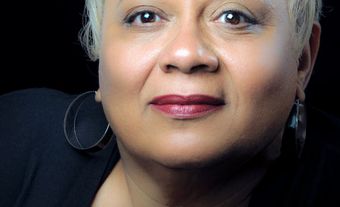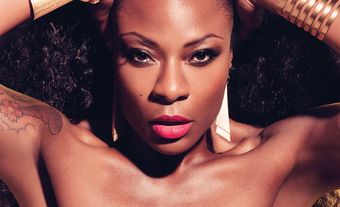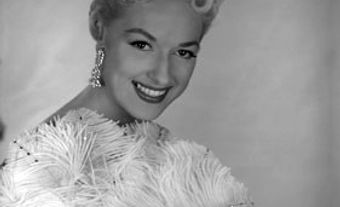Elnora Ruth Collins (née Procter), CM, singer, actor (born 21 November 1919 in Edmonton, Alberta; died 3 March 2024 in Surrey, BC). Canada’s “first lady of jazz,” Eleanor Collins was the first Canadian woman and the first Black entertainer in Canada to have her own national television show, CBC TV’s The Eleanor Show (1955). Often compared to American singer Lena Horne, Collins performed on many television and radio variety shows, as well as in clubs. She was a Member of the Order of Canada and the BC Entertainment Hall of Fame and the recipient of numerous lifetime achievement awards. Canada Post released a commemorative stamp in her honour in January 2022.

Early Years
Eleanor Collins grew up in Edmonton, Alberta. Her parents, of Black and Creole Indian heritage, were among the more than 1,000 Black homesteaders from Oklahoma who settled on the Canadian prairies. (See also: Homesteaders; Amber Valley.)
Collins’s first musical experiences and early musical training were informal. From childhood, she sang hymns and spirituals with her family and in their Baptist church. She was a natural talent, and in 1934 at age 15 she won a singing contest. She sang with a dance band in Edmonton, with the Three E’s and on radio station CFRN.
Early Career
In the late-1930s, Collins moved to Vancouver, where she sang from 1940 to 1942 on CBC Radio with the gospel group Swing Low Quartet, which included her sisters Ruby Sneed and Pearl Brown. This began her long association with the CBC, which included performances on the radio show Serenade in Rhythm, which was broadcast to troops overseas. Collins also performed until 1947 with Ray Norris’s jazz quintet.

In 1942, she married Richard Collins and began a family, which eventually numbered four children. The family moved to suburban Burnaby, where, as their community’s first Black family, they were met with prejudice in the form of an (unsuccessful) petition to prevent them from moving in. To combat the prejudice, the family made special efforts to fit into the neighbourhood as role models; Eleanor volunteered at school and taught music to Girl Guides. (See also Black Canadians.)
After raising her children for several years, in autumn 1951 Collins recorded for CBC International Service with the Ray Norris Quintet. She then branched into acting in Vancouver theatre, appearing in a production of You Can’t Take It With You in 1953. For Theatre Under The Stars, she performed in Kiss Me Kate in 1953 and Finian’s Rainbow in 1952 and 1954. In 1952, she also sang in a concert at Vancouver’s Stanley Park, which was recorded; this and some other early performances were with her children, continuing her family’s tradition of ensemble music-making.
Television and Radio Appearances
Collins began to perform frequently in the 1950s, becoming known as Vancouver’s “first lady of jazz.” In 1954, she made her television debut on CBC Vancouver’s ground-breaking variety show Bamboula: A Day in the West Indies. The series lasted only three episodes but was noteworthy as the first Canadian television show with a mixed-race cast, as well as the first live music TV show broadcast from Vancouver.
CBC management, impressed with audience reaction to Bamboula, quickly gave Collins her own variety series, The Eleanor Show. It ran from 19 June to 11 September 1955. The Eleanor Show made Collins the first female Canadian singer to have her own television show, preceding even Juliette, which debuted in 1956. Even more importantly, Collins was a Black headliner in an era when the vast majority of television stars were white. American television networks had earlier mounted a few shows headlined by Black performers, the first being The Hazel Scott Show in 1950. Nat King Cole’s successful American TV show did not premiere until 1956. To place Collins’s achievement in context, it was in 1954 that the US Supreme Court ruled that racial segregation of American public schools was unconstitutional.
Meet Eleanor Collins - Canada's first lady of jazz and the first Black person in North America to host a nationally broadcast television series, "The Eleanor Show" which began in 1954.
Note: The Secret Life of Canada is hosted and written by Falen Johnson and Leah Simone Bowen and is a CBC original podcast independent of The Canadian Encyclopedia.
Although The Eleanor Show was short-lived, Collins guest-starred on numerous CBC TV and radio shows through the 1950s and 1960s, singing blues and jazz standards, spirituals and gospel music. She appeared on the TV variety show Riding High (1955) for several weeks and in the one-episode Back O’ Town Blues (1955). She also sang on The Jackie Rae Show (1956); in another special, Strange House; and at the Pacific National Exhibition (1956), a concert that was later broadcast on television.
Collins’s increasing exposure led to offers to sing in the US. She refused these, preferring to remain in the more racially-integrated Canada that had been her parents’ original choice. Her career remained concentrated on various CBC shows and on live club dates and other performances in the Vancouver area with such jazz musicians as Chris Gage, Lance Harrison, Doug Parker and Dave Robbins. In 1956, she appeared in an episode of the TV show Pacific 13, and in 1958 she sang at the first Vancouver International Festival. She starred on CBC Radio Vancouver’s Eleanor Sings the Blues (1960); sang spirituals on Were You There? (1961) and other CBC Radio shows in 1961; and appeared in Blues and The Ballad. She was a frequent guest on the highly popular Juliette show (1961, 1962 and 1964), and starred on Quintet with the Chris Gage Trio, performing show tunes, folk and blues.
In the heyday of the musical variety show, Collins appeared on many other television and radio shows as a guest: Call For Music (1958); A Hatful of Music (1960); Saturday Night Jamboree (1963); Heritage (1963); Come Listen Awhile (1964); As Time Goes By (1967); Moods of Man (1968); Sounds ’67, ’68, and ’69; and The Mike Neun Show (1970-1971). Other notable performances of this period include a role in the CBC TV religious special Place of the Skull (1962), and on Parade. From 1963 to 1964, she was a regular on the CTV series Network.
Her second TV show, Eleanor, a continuation of the 1954 original, ran from 1 February to 28 March 1964. Backed by the Chris Gage Trio, she sang show tunes, standard pop songs and contemporary hits.
Later Career
With the arrival of the 1970s and the decline in popularity of variety shows, Collins was heard less often, but she continued to make occasional appearances over the following decades. One such appearance was for Canada Day celebrations on Parliament Hill in 1975. She was also seen in the 1977 television special Easter in Israel. During this period, she became music director at Unity Church in Vancouver.
In the 1980s, Collins returned to Edmonton to sing at the Jazz City International Jazz Festival. She also sang with the Tommy Banks orchestra on CBC TV’s Jazz Canada and appeared on Celebrity Cooks. The decade also saw her performing on CBC Radio’s Jazzland (1981), singing for a benefit at Vancouver’s Hot Jazz Club (1988) and interviewing for CBC TV’s Then & Now (1988).
In her seventies, Collins sang with saxophonist Fraser MacPherson at the Vancouver nightclub Richard’s on Richards and performed at a tribute to CBC host Bob Smith at Vancouver’s Commodore Ballroom. The Collins family was profiled in the 1994 video documentary Hymn to Freedom: The History of Blacks in Canada.
Collins continued to occasionally perform into her eighties and beyond, singing annually at Vancouver’s Orpheum Theatre for Remembrance Day shows and occasionally for her church. For Black History Month in 2015, she sang at a fundraiser for an anti-racism program.
Recordings
Collins declined many offers to record with US recording companies. The few recordings she made were mostly for the CBC. She recorded with Ray Norris in 1951 and on CBC broadcast albums by Chris Gage and Dave Robbins in the 1960s. In 1962, she recorded in Vancouver with the Dave Robbins Quintet and the Fraser MacPherson Quintet for the Jazz From Canada series. She also recorded “Meet the Girls” with Monique Leyrac, Neil Chotem and Chris Gage. Decades later, she recorded Ruth Lowe’s “I’ll Never Smile Again” for the 2003 CD She Bop! A Century of Jazz Compositions by Canadian Women.
Honours and Legacy
As the first woman and the first Black entertainer in Canada to have her own national television show, Eleanor Collins achieved national recognition. Through her ground-breaking television broadcasts, Collins fostered race relations in Canada and paved the way for a more racially diverse entertainment scene.
The first of many awards came in 1986, when she received the Centennial Distinguished Pioneer Award from the City of Vancouver. In 1992, in her seventies, Collins’s status as a legendary Canadian jazz singer was recognized when she was inducted into the BC Entertainment Hall of Fame and given a star on Vancouver’s Starwalk.
In 1998, Collins was recognized by the Black Historical and Cultural Society during Black History Month. She received the 2005 Sam Payne Lifetime Achievement Award, and for her 90th birthday CBC’s Hot Air Jazz Show paid tribute to her. She was also profiled in the book They Desire a Better Country: The Order of Canada in 50 Stories. Collins received national and international recognition in the form of lifetime achievement awards from the Black Canadian Awards (2014) and the US organization Black Women in Jazz (2015). For her services to music and as a role model for race relations, Collins was named a member of the Order of Canada in 2014. In January 2022, at the age of 102, she was featured in a commemorative stamp issued by Canada Post.
Awards
- Distinguished Centennial Pioneer Award, City of Vancouver (1986)
- Induction and Starwalk Star, BC Entertainment Hall of Fame (1992)
- Sam Payne Lifetime Achievement Award, ACTRA (2006)
- Member, Order of Canada (2014)
- Lifetime Achievement Award, Black Canadian Awards (2014)
- Lifetime Achievement Award, Black Women in Jazz (2015)
- Award of Excellence, Black Cultural Research Society of Alberta

 Share on Facebook
Share on Facebook Share on X
Share on X Share by Email
Share by Email Share on Google Classroom
Share on Google Classroom




